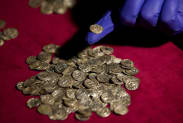Bed Bath & Beyond Inc.
BBBY,
Bed Bath & Beyond was moved to underweight from sector weight, and Lowe’s was lowered to sector weight from overweight.
Both stocks have benefited from COVID-related “nesting” trends in which shoppers have been spending on items for the home. Prior to the pandemic and before social distancing and other precautions were put in place, consumers focused a good portion of their spending on things like dinners out, vacations and other activities.
While KeyBanc analysts say the home-spending trend will continue during the first half of 2021, they expect that to change during the second half of the year.
“[W]e recommend caution and selectivity among home-related retailers and manufacturers with a focus on clear market share growth stories,” analysts wrote.
Bed Bath & Beyond shares have also run up during the apparent short squeeze last week that also enveloped GameStop Corp.
GME,
Read: Here are the biggest short squeezes in the stock market, including GameStop and AMC
And: It isn’t just GameStop: Here are some of the other heavily shorted stocks shooting higher
Bed Bath & Beyond shares nearly doubled over the past month, up nearly 99%, and have gained nearly 150% over the past year.
Lowe’s stock is up 43.5% for the last 12 months.
The benchmark S&P 500 index
SPX,
In both cases, KeyBanc expressed support for the steps taken by company executives.
“[Bed Bath & Beyond] has already made several improvements to the business, particularly in its merchandising strategy, omnichannel capabilities, and promotional strategies,” analysts said.
“Furthermore, the company has sold off most of its portfolio of non-core assets including Cost Plus World Market, Christmas Tree Shops, and Personalization Mall, which has unlocked value, in our view, while strengthening management’s focus on the core business.”
And analysts say they remain “positive” about the job that Lowe’s Chief Executive Marvin Ellison and his team are doing .
See: Bed Bath & Beyond sells Cost Plus World Market
However, analysts say these companies have gotten a boost from a $500 billion shift to home spending during the pandemic and are raising a cautious eye towards the potential impact of the COVID-19 recovery.
“[L]ooking to 2H, we believe there is a high likelihood that the consumer ‘returns to normal,’ which could shift spending back toward experiences, travel, and entertainment at the expense of home-related spending and the purchase of ‘stuff,” KeyBanc analysts led by Bradley Thomas wrote.
“This creates a risk of not only difficult comparisons, but a reversal in the ‘nesting’ share of wallet shift.”
KeyBanc upgraded Rent-A-Center Inc.
RCII,





